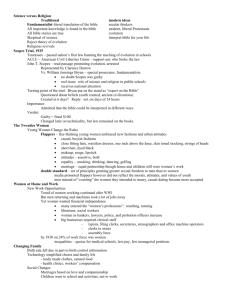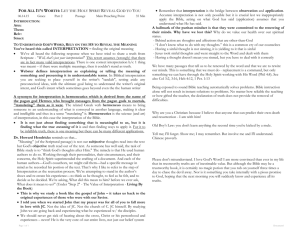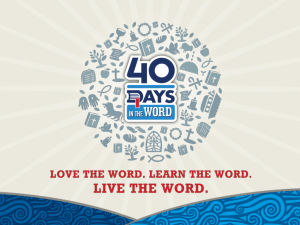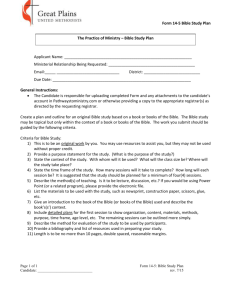File: Bible Study tools
advertisement
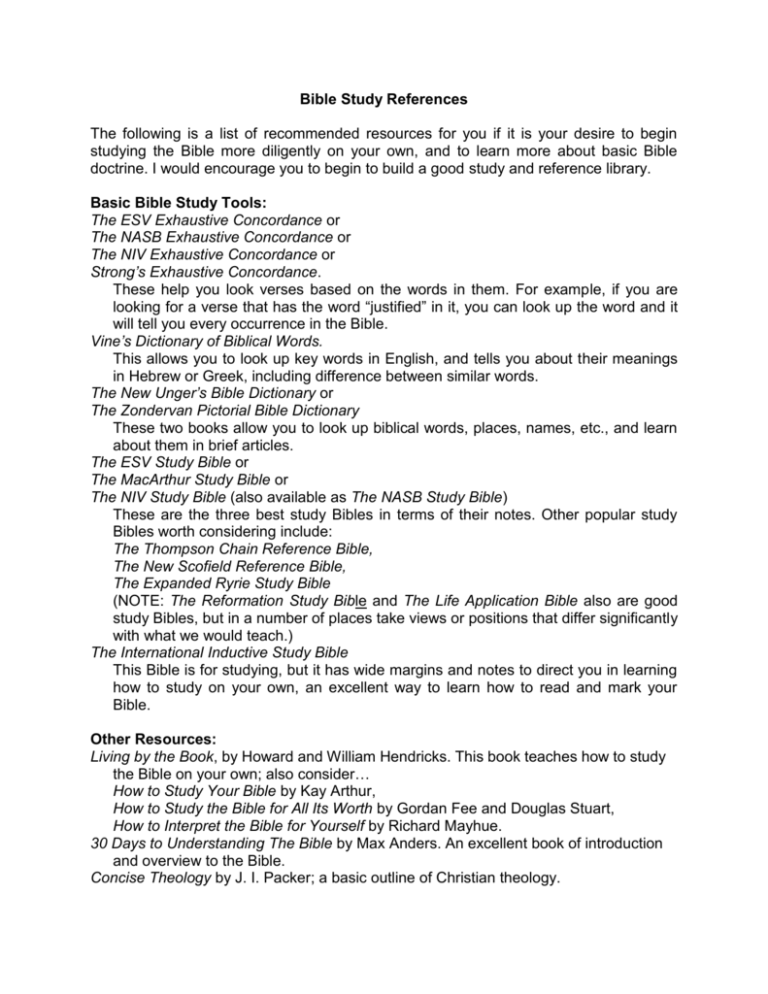
Bible Study References The following is a list of recommended resources for you if it is your desire to begin studying the Bible more diligently on your own, and to learn more about basic Bible doctrine. I would encourage you to begin to build a good study and reference library. Basic Bible Study Tools: The ESV Exhaustive Concordance or The NASB Exhaustive Concordance or The NIV Exhaustive Concordance or Strong’s Exhaustive Concordance. These help you look verses based on the words in them. For example, if you are looking for a verse that has the word “justified” in it, you can look up the word and it will tell you every occurrence in the Bible. Vine’s Dictionary of Biblical Words. This allows you to look up key words in English, and tells you about their meanings in Hebrew or Greek, including difference between similar words. The New Unger’s Bible Dictionary or The Zondervan Pictorial Bible Dictionary These two books allow you to look up biblical words, places, names, etc., and learn about them in brief articles. The ESV Study Bible or The MacArthur Study Bible or The NIV Study Bible (also available as The NASB Study Bible) These are the three best study Bibles in terms of their notes. Other popular study Bibles worth considering include: The Thompson Chain Reference Bible, The New Scofield Reference Bible, The Expanded Ryrie Study Bible (NOTE: The Reformation Study Bible and The Life Application Bible also are good study Bibles, but in a number of places take views or positions that differ significantly with what we would teach.) The International Inductive Study Bible This Bible is for studying, but it has wide margins and notes to direct you in learning how to study on your own, an excellent way to learn how to read and mark your Bible. Other Resources: Living by the Book, by Howard and William Hendricks. This book teaches how to study the Bible on your own; also consider… How to Study Your Bible by Kay Arthur, How to Study the Bible for All Its Worth by Gordan Fee and Douglas Stuart, How to Interpret the Bible for Yourself by Richard Mayhue. 30 Days to Understanding The Bible by Max Anders. An excellent book of introduction and overview to the Bible. Concise Theology by J. I. Packer; a basic outline of Christian theology. Know the Truth by Bruce Milne (another good outline of theology, including application of the truth to life). Know What You Believe by Paul Little (basic introduction to theology; Little’s books have been popular for many years). Know Why You Believe by Paul Little (basic introductions to apologetics—defending your faith). More reference works for study: The Moody Handbook of Theology ed. By Paul Enns Systematic Theology by Wayne Grudem Evangelical Dictionary of Theology by Walter A. Elwell The Kingdom of the Cults by Walter Martin, revised by Ravi Zacharias (great one volume handbook on major cults and world religions) Church History in Plain Language by Bruce Shelley (exactly what it’s title says, and an excellent book). The Bible Knowledge Commentary by the faculty of Dallas Theological Seminary. This two-volume work is a good overall commentary on the whole Bible. For assistance in personal devotion: Knowing God by J. I. Packer. Perhaps a bit more challenging, but one of the most influential books for many Christians today. Desiring God by John Piper. A great book on developing a passion to live for the glory of God; also by the same author: Future Grace, and A Hunger for God. The Discipline of Grace by Jerry Bridges. A description of the disciplines needed for spiritual growth. Also by the same author: The Practice of Godliness, The Pursuit of Holiness, The Joy of Fearing God, Trusting God. Spiritual Disciplines of the Christian Life, by Donald Whitney. Describes the basic disciplines used by many throughout the centuries to grow closer to Christ. Also by the same author: Ten Questions to Diagnose Your Spiritual Health.





